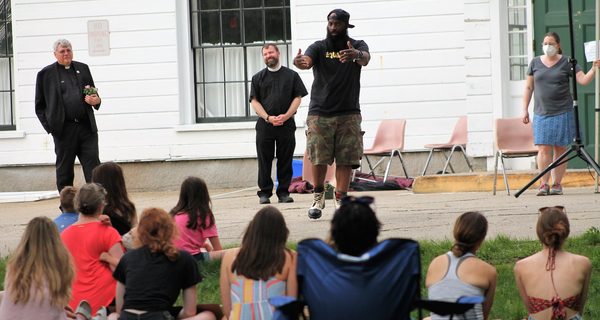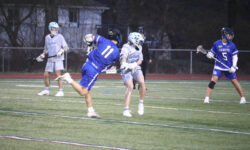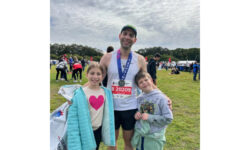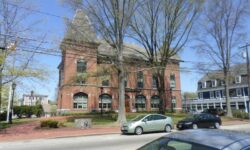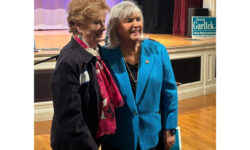By James Kinneen
Hometown Weekly Reporter
Closing in on the one year anniversary of George Floyd’s murder, First Parish Unitarian Universalist held an anti-racism vigil, to both “honor those who have lost their lives due to the devastating effects of racism,” and “support those who have dealt with the impacts of racism in their daily lives, listen to personal stories that may help us better acknowledge and understand the unity in our neighbors, and to reflect on our own awakenings in an effort to become a more inclusive and welcome community.”
To that end, the day began with a pair of politicians speaking. First came State Representative Denise Garlick, who quoted Maya Angelou saying “do the best you can until you know better. Then when you know better, do better,” as a call to action. Next came State Senator Paul Feeney, who compared racism to the coronavirus, noting that while COVID came from the outside, “racism, being the virus that it is, attaches itself to our own weaker selves.” In a call to be more self aware, Feeney implored the assembled to realize “it’s not enough to just say 'I don’t engage in that,' but to say 'when I see it, I’m going to call it out and if I can change it, I’m going to change it.'" Continuing the metaphor, Feeney later added “the antidote to racism doesn’t come from Pfizer or Moderna, it comes from the creator.”
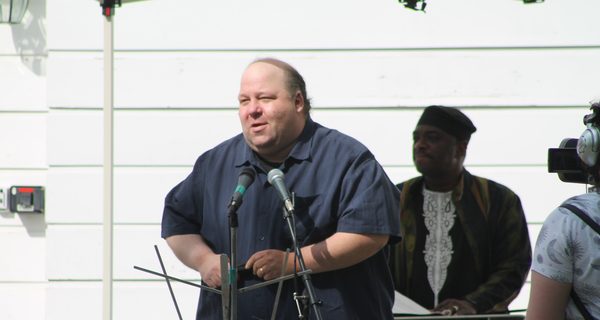
Nicole Hall next read a poem from Martha Collins, all about how she looked at her piano and realized "An African slave could have carried a tusk/that was cut into white keys I played, starting/with middle C and going up and down.” Hall used the poem to note how she, as a white woman, could spend her life ignoring and not thinking about racism just as so many don’t think about where the ivory for their pianos came from. Instead, she worked to form Medfield Together to identify and fight racism in Medfield.

Regie Gibson was the day’s most exciting speaker. A Chicago cop’s kid, although his father left the force for another job when Gibson was a teenager, he talked about how he has a love/hate relationship with the uniform, but how he feels the country's biggest problem is a lack of empathy.
“I get to this point of thinking about Derek Chauvin," he explained, "and I ask myself what has to happen to an individual to deny yourself the empathy to be okay with doing that? But we know this happens. We have people who can attack our Capitol with ‘back the blue’ flags and kill police officers. Know what I mean? There is a disconnect of empathy that happens here and I ask myself is it because we in this country don’t know each other, don’t have friends with one another.”
But Gibson was clear these cross-race friendships wouldn’t be easy to come by when he stated “The truth is we don’t trust you. We don’t. And there’s a lot of history that goes behind that. So when you do decide to reach out in friendship, understand we’re going to back off. 'Why are you trying to be friendly with me, what’s the deal?' But keep coming back. We respect consistency. We respect you getting burned and coming back again. The moment you say, 'well, I tried and they don’t want to accept me,' we walk away like: 'that’s what I thought. All mouth. No action. Or not enough action.'”

Medfield artist Kurt Jackson talked about the racial incidents he has dealt with over the course of his life, ranging from being called slave character names in his Norton school once “Roots” hit TV screens, to having to skip prom because his date’s mom, who was a middle school teacher, wouldn’t let her daughter go with a Black man, all the way to having the police called on him twice in a row when he showed up early to a carpentry job, getting pulled over despite being passed by a driver going much faster than him, and being led out of his own home handcuffed because the police wouldn’t accept that he was not his brother - despite the house being covered in newspaper clippings of his sports accomplishments - and only being released when a white neighbor vouched for him.
If you heard that and were hoping racist bullying is something that stopped in the eighties, Medfield’s Madeline Rothstein dispelled that notion in her essay, although she was not there in person to read it. Rothstein, who is Jewish, cited treatment included being told by a classmate “all Jew should burn,” being called “firewood” in middle school, being told she killed Jesus in kindergarten, and being dismissed by a teacher over her concerns about Medfield’s mascot.
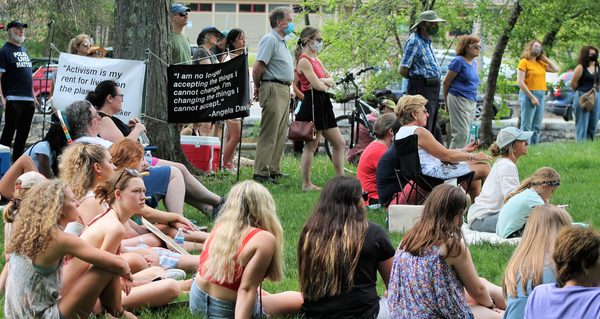
The day's final speaker was Jamele Adams, who spent much of the day keeping the tent from being blown away, which he used as a metaphor for all the races and genders working together. Adams read his poem, “Who Shot You”, which effectively outlines the various places people of color have been shot, using “shot” as a repeating rhyme until it culminates with: “Can you imagine a place where you cannot get shot? I cannot.”
While there is a video of Adams performing the poem on a city street available on YouTube, this version was a bit longer and added allusions to Eric Garner in a line about being choked out for selling cigarettes, and the University of Florida commencement controversy from 2018, in which a white employee shoved Black students who were taking too long to walk across the stage.
The day ended with a prayer and a reading of the names of the people whose deaths the speaker attributed to racism, including Adam Toledo, Pam Turner, Dion Johnson, Rayshard Brooks, Yvette Smith and Daunte Wright.




